PRINCETON, NJ -- The Bush administration is tapping the weighty symbolism of the location for this week's Arab-Israeli peace summit -- the U.S. Naval Academy in Annapolis, Md. -- to convey the importance of perseverance, sacrifice, and hope to those gathered. If nothing else, the site's grandeur and historical significance signal that the United States is seriously committed to the talks.
That commitment is likely welcomed by Americans, who have repeatedly over the years told Gallup that the development of a peaceful solution to the Arab-Israeli conflict ought to be an important U.S. foreign policy goal. A July 2006 Gallup survey found 50% of Americans calling such an effort a "very important" goal and another 35% calling it "somewhat important," while only 15% considered it less important.
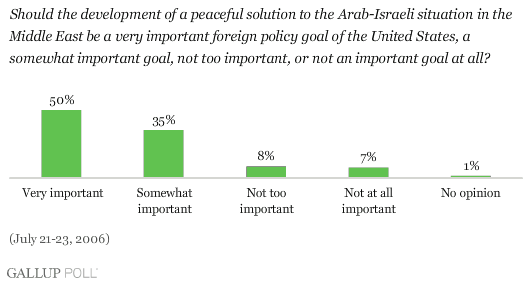
Americans believe the conflict is highly relevant for the United States, suggesting there is more than altruism involved in the importance they attach to its resolution. In a 2004 Gallup Poll, the conflict between Israel and the Palestinians ranked 3rd out of 11 conflicts and threats rated on the survey, with 58% of Americans calling it a critical threat to the vital interests of the United States. Only international terrorism and the spread of weapons of mass destruction to unfriendly powers ranked higher at that time.
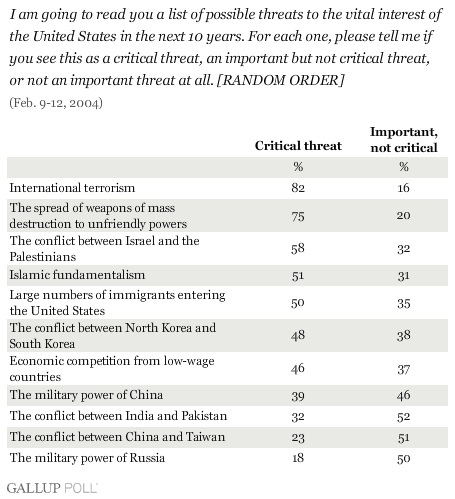
President Bush's announcement Monday that Mideast peace will be a top priority for the duration of his term is a remarkable shift from his long-standing position against the United States serving as an active peace broker.
It may also be the beginning of repairing Bush's public image on the subject. Earlier this year, only 44% of Americans felt Bush was doing enough to find a solution to the Israeli-Palestinian conflict while 51% said he was not doing enough. By contrast, in June 2002 -- at a time when Bush's overall job rating was much higher in the aftermath of 9/11 -- the majority of Americans had been positive about Bush on this question.
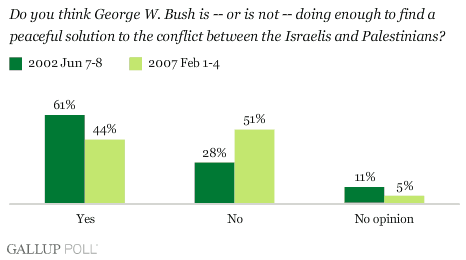
Reaching a peace agreement will certainly depend on creating an independent Palestinian state. In 2003, President Bush endorsed a "road map" to peace that includes the idea of a Palestinian state. Much of the advance media coverage of this week's peace summit suggests Israeli and Palestinian leaders are entering the talks with the goal of establishing Palestinian independence as part of a two-state solution to the conflict.
Gallup's historical polling on the question of a Palestinian state suggests that U.S. public support could be heavily contingent on how well the plan safeguards Israel's security. In May 2002, Gallup found only 48% of Americans in favor of the establishment of an independent Palestinian state on the West Bank and Gaza Strip; about one-quarter (27%) were opposed while another quarter were unsure. However, the following month, in June 2002, Gallup found nearly three-quarters of Americans in favor of such a state if the Palestinian government demonstrated that it could put an end to suicide bombings in Israel.
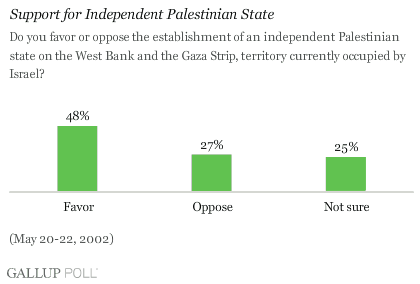
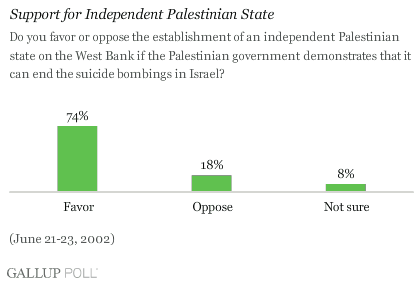
Americans favor Palestinian statehood, but not at the expense of Israeli security. This finding conforms with Americans' general partiality toward Israel over the Palestinians. Gallup's long-standing trend on U.S. sympathies in the conflict has consistently found many more Americans siding with the Israelis than with the Palestinians -- most recently in Gallup's February 2007 update by a 58% to 20% margin.
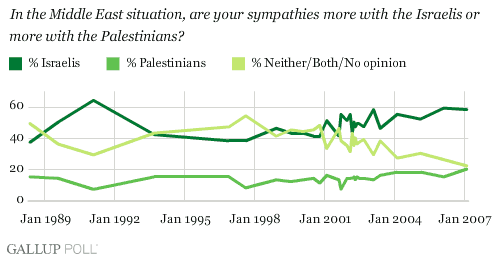
Similarly, 63% of Americans have a favorable view of Israel, overall, compared with only 16% of Americans feeling favorably about the Palestinian Authority.
Still, when it comes to peace talks, Americans appear to want the United States to adopt a neutral stance. Gallup polling from 1998 through 2002 consistently found between two-thirds and three-quarters of Americans saying the United States should not take either side in the conflict. Of those who did favor taking sides, the great preponderance wanted to side with Israel. However, even at its high point, only a quarter or so of Americans held this view.
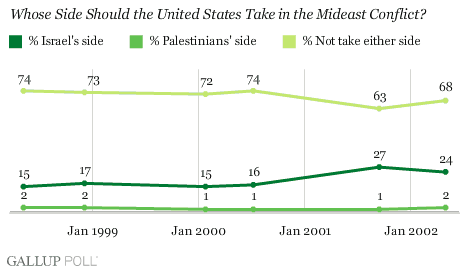
More recently, Gallup found Americans fairly closely divided between whether the United States should put more pressure on the Palestinians (39%) or on the Israelis (30%) in order to resolve the conflict between the two peoples. The remaining 31% had no opinion or felt equal pressure or no pressure should be applied.
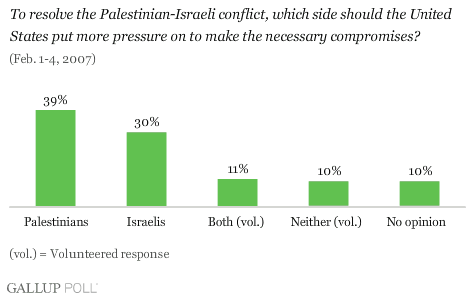
Bottom Line
President Bush is investing the power of his presidency where Americans want it: working to resolve the decades-old conflict between Palestinians and Israelis. Going in, Americans may not have much optimism that he will be successful. As of February 2007, only 34% of Americans said they believed there would ever come a time when Israel and its Arab neighbors would resolve their differences and live in peace. However, theirs is not a hardened pessimism. Gallup has repeatedly found Americans' spirits on this question rebounding, with as many as 51% saying there will come a time when Arabs and Israelis will live in peace.
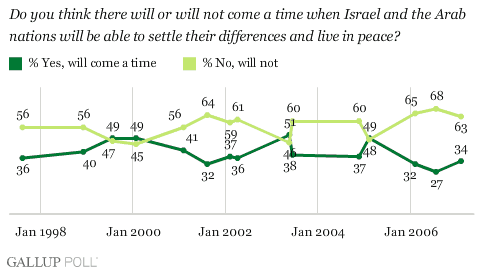
Survey Methods
The survey results reviewed here are all based on Gallup telephone polls of roughly 1,000 national adults, aged 18 and older. For results based on samples of this size, one can say with 95% confidence that the maximum margin of sampling error is ±3 percentage points.
In addition to sampling error, question wording and practical difficulties in conducting surveys can introduce error or bias into the findings of public opinion polls.
